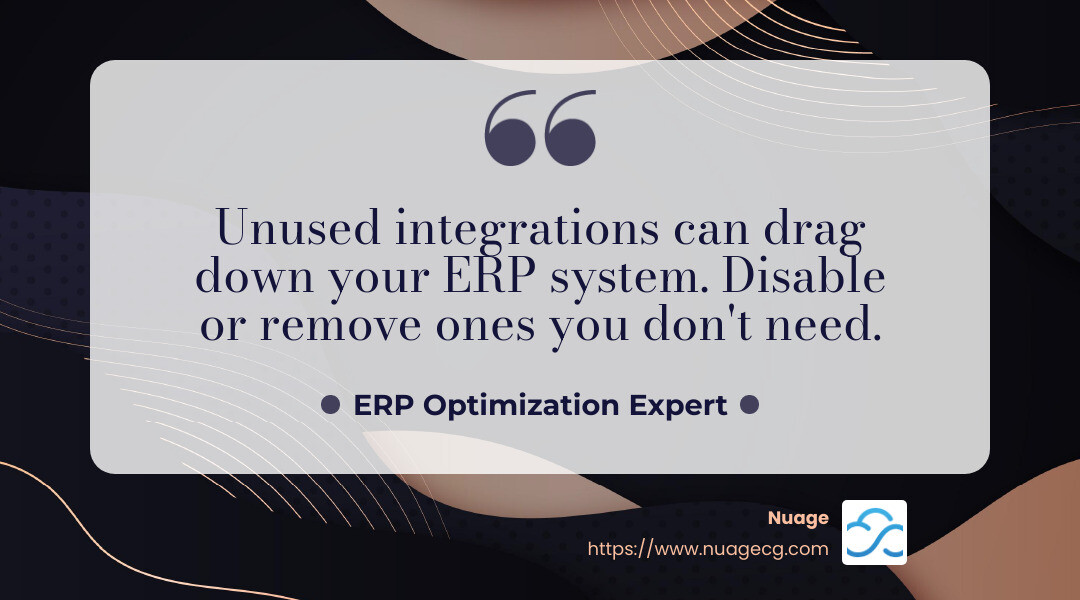NetSuite software optimization is a strategic approach to enhancing your enterprise resource planning (ERP) system, setting your business on a path to growth and efficiency. Whether you’re embarking on your ERP journey or refining existing operations, optimizing NetSuite can yield substantial improvements. To get started, consider these key actions:
-
Customization Balance: Customize NetSuite to fit your needs, but avoid over-customization. Too many custom scripts can slow down your system.
-
Third-Party Integrations: Ensure that any third-party integrations are necessary and functioning properly. Poor integrations can lead to data inconsistencies and system slowdowns.
-
Script Optimization: Review and optimize any custom scripts you use. Simplifying these can lead to faster load times and better system performance.
- Conduct Scheduled Searches: Use scheduled searches to keep your data retrieval efficient. These run in the background, ensuring data is ready when you need it without slowing down your system.
- Monitor System Health: Use tools like NetSuite’s Application Performance Management Suite App to evaluate your system’s performance metrics. This helps you pinpoint and resolve issues before they escalate.
- Stay Current: Regularly check for and install NetSuite updates. These updates often contain important security patches and performance improvements that can prevent potential issues.
- Plan Updates: Schedule updates during off-peak hours to minimize disruption to your operations. This ensures your system is always running on the latest version without affecting productivity.
- Customize Your Dashboards: Tailor your dashboards to display the information most relevant to your role. This customization can help you make quicker, more informed decisions.
- Optimize KPI Portlets: Use KPI portlets to track key performance indicators. Properly setting up these portlets ensures you have a clear view of your business metrics at a glance.
-
Page Loading: Adjust your preferences to delay the loading of sublists. This means your pages load faster initially and fetch additional information only when needed. You can find this setting under the General Subtab in NetSuite preferences.
-
Dropdown Entries: Limit the number of entries in dropdown lists to speed up page loading. A setting of 50 entries is often optimal, as it provides a good balance between speed and usability.
-
User Satisfaction: Sometimes, users find the interface or features not aligned with their specific needs. Customizing dashboards and reports can significantly improve user experience and satisfaction.
-
Training: Lack of adequate training can lead to frustration. Ensuring your team is well-trained on NetSuite’s functionalities can help them harness its full potential, reducing the likelihood of switching to another platform.
-
Strategic Growth: ACS Optimize provides custom support to align NetSuite configurations with your evolving business needs. This ensures your system scales with your growth, rather than becoming a bottleneck.
-
Business Reviews: Regular business reviews with NetSuite experts help you stay on track with your goals. These reviews identify areas for improvement and ensure that your system supports your strategic objectives.
By focusing on these areas, you can ensure your NetSuite system is running at its best. This not only improves efficiency but also improves user satisfaction and reduces operational costs.
For more insights on optimizing your ERP system, explore our main NetSuite page.
In the next section, we’ll dive deeper into key strategies for optimizing NetSuite, including data management and customization balance.
Key Strategies for Optimizing NetSuite
When it comes to NetSuite software optimization, several key strategies can transform how your ERP system performs. Let’s explore the core areas that can make a significant difference.
Data Management
Effective data management is the backbone of a well-optimized NetSuite system. Clean, accurate data ensures that your ERP functions smoothly. Regularly clean up your data by removing duplicates and outdated records. This practice not only improves system performance but also improves decision-making by ensuring that you’re working with reliable information.
Case Study: A company streamlined its operations by implementing a routine data cleanup process. By doing so, they reduced errors and improved their reporting accuracy by 15%.
Customization Balance
Customization can tailor NetSuite to your specific needs, but it’s important to find a balance. Over-customization can lead to complex systems that are hard to manage and maintain. Stick to using NetSuite’s built-in features whenever possible. These features are designed to handle a wide range of business needs without the need for extensive custom work.
Pro Tip: Only customize when absolutely necessary. This not only saves time but also reduces risks associated with future updates.
Third-Party Integrations
Integrations with third-party applications can improve your NetSuite experience—when done right. Ensure these integrations are necessary and functioning efficiently. Poorly managed integrations can lead to data inconsistencies and slow down your system. Regularly assess and optimize these connections to maintain system integrity.
Quote: “Unused integrations can drag down your ERP system. Disable or remove ones you don’t need.”

Script Optimization
Scripts can automate processes and improve efficiency, but they need to be optimized. Review your custom scripts regularly and simplify them where possible. This can significantly reduce load times and improve overall system performance.
Real-World Example: A business improved its system response time by 25% after streamlining its custom scripts.
By focusing on these strategies, you can open up the full potential of your NetSuite system. This optimization not only boosts efficiency but also improves user satisfaction and reduces costs.
In the next section, we’ll explore how to further improve NetSuite performance with regular assessments and updates.
Explore more about NetSuite on our main page
How to Improve NetSuite Performance
Ensuring your NetSuite system runs smoothly and efficiently is crucial for your business operations. Here’s how you can improve performance through regular assessments, timely updates, and smart dashboard configurations.
Performance Assessments
Performing regular performance assessments is a proactive way to keep your NetSuite system in top shape. These assessments help identify any bottlenecks or inefficiencies in your current setup.
Example: A company noticed a 30% improvement in processing speed after conducting regular performance assessments and addressing identified issues.
NetSuite Updates
Keeping your NetSuite system updated is key to maintaining optimal performance. Updates often include patches and improvements that improve system stability and functionality.
Fact: Businesses that consistently update their ERP systems experience fewer disruptions and improved overall performance.
Dashboard Configuration
A well-configured dashboard can significantly improve how you interact with NetSuite, making it easier to access critical data quickly.
Tip: Limit the number of graphs and reports on your dashboard to avoid clutter and ensure faster load times.
By focusing on these areas, you can significantly improve your NetSuite system’s performance. Regular assessments, timely updates, and strategic dashboard configurations are essential steps in your NetSuite software optimization journey. For more insights, visit our main page about NetSuite.
In the following section, we’ll address some common questions about NetSuite optimization and how you can make the most out of your ERP system.
Explore more about NetSuite on our main page.
Frequently Asked Questions about NetSuite Optimization
How to make NetSuite run faster?
Improving the speed of your NetSuite system is essential for efficiency. Here are some quick tips:
Pro Tip: Regularly clean up your data by removing duplicates and outdated information. This not only speeds up your system but also ensures data accuracy.
Why do people leave NetSuite?
While NetSuite is a powerful ERP solution, there are reasons users might choose to move on:
Fact: Companies that invest in ongoing training and user support see higher satisfaction rates and better system utilization.
What is NetSuite ACS Optimize?
NetSuite ACS (Advanced Customer Support) Optimize is a strategic service designed to help businesses grow and maximize their ERP investment:
Case Study: A business that used ACS Optimize saw a 40% increase in operational efficiency by aligning their NetSuite setup with their strategic goals.
By addressing these common questions, you can better understand how to optimize your NetSuite experience. Whether it’s speeding up your system, improving user satisfaction, or leveraging strategic growth services, NetSuite offers solutions to improve your ERP journey.
Explore more about NetSuite on our main page
Conclusion
In the changing world of digital change, staying ahead means embracing change and optimizing your tools. At Nuage, we specialize in guiding businesses through this journey. With over 20 years of experience in ERP systems, we understand the complexities and challenges of digital change.
Why Partner with Nuage?
Our expertise lies in not just implementing software but in crafting custom solutions that grow with your business. Whether you’re in manufacturing or the food and beverage industry, our deep understanding of these sectors ensures that your ERP system is not just a tool, but a strategic asset.
Digital Change and ERP Expertise
Digital change is more than just adopting new technology—it’s about reshaping your business for future success. Our partnership with NetSuite and allows us to offer comprehensive solutions that meet your unique needs. We focus on optimizing your ERP experience to drive growth and efficiency.
Your Next Steps
Ready to transform your ERP experience with NetSuite? Explore more about NetSuite on our main page to find how we can support your journey. If you’re interested in solutions, learn more here.
At Nuage, we’re committed to being your trusted partner in digital change. Let’s work together to open up the full potential of your ERP system and position your business for long-term success.
